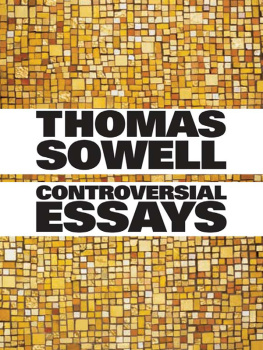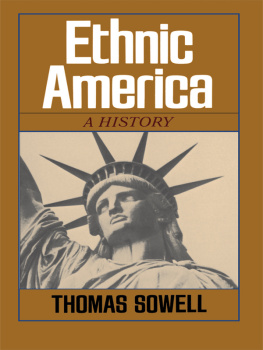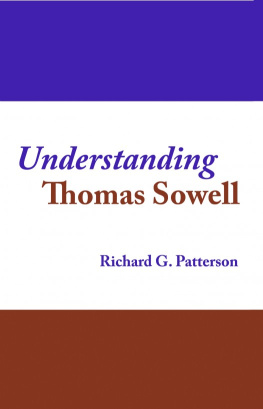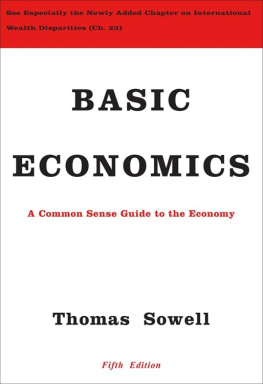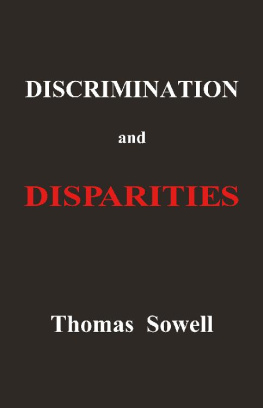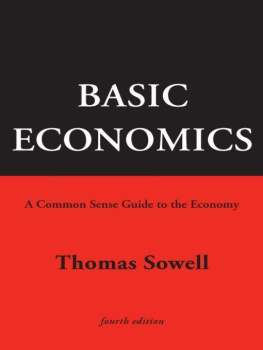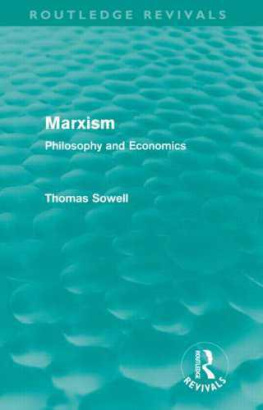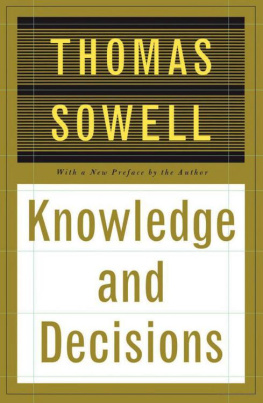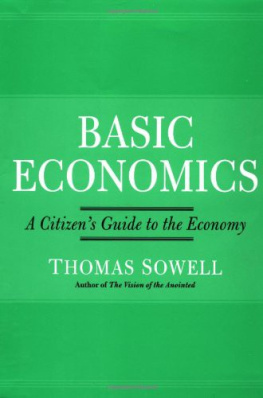Sowell - Basic Economics
Here you can read online Sowell - Basic Economics full text of the book (entire story) in english for free. Download pdf and epub, get meaning, cover and reviews about this ebook. year: 2014, publisher: Basic Books, genre: Politics. Description of the work, (preface) as well as reviews are available. Best literature library LitArk.com created for fans of good reading and offers a wide selection of genres:
Romance novel
Science fiction
Adventure
Detective
Science
History
Home and family
Prose
Art
Politics
Computer
Non-fiction
Religion
Business
Children
Humor
Choose a favorite category and find really read worthwhile books. Enjoy immersion in the world of imagination, feel the emotions of the characters or learn something new for yourself, make an fascinating discovery.

Basic Economics: summary, description and annotation
We offer to read an annotation, description, summary or preface (depends on what the author of the book "Basic Economics" wrote himself). If you haven't found the necessary information about the book — write in the comments, we will try to find it.
Sowell: author's other books
Who wrote Basic Economics? Find out the surname, the name of the author of the book and a list of all author's works by series.
Basic Economics — read online for free the complete book (whole text) full work
Below is the text of the book, divided by pages. System saving the place of the last page read, allows you to conveniently read the book "Basic Economics" online for free, without having to search again every time where you left off. Put a bookmark, and you can go to the page where you finished reading at any time.
Font size:
Interval:
Bookmark:


A few lines of reasoning can change
the way we see the world.
Steven E. Landsburg
Copyright 2015 Thomas Sowell
Published by Basic Books,
A Member of the Perseus Books Group
All rights reserved. No part of this book may be reproduced in any manner whatsoever without written permission except in the case of brief quotations embodied in critical articles and reviews. For information, address Basic Books, 250 West 57th Street, 15th Floor, New York, NY 10107.
.
Library of Congress Control Number: 2014945836
ISBN: 978-0-465-05684-2
T he most obvious difference between this book and other introductory economics books is that Basic Economics has no graphs or equations. It is also written in plain English, rather than in economic jargon, so that it can be readily understood by people with no previous knowledge of economics. This includes both the general public and beginning students in economics.
A less obvious, but important, feature of Basic Economics is that it uses real-life examples from countries around the world to make economic principles vivid and memorable, in a way that graphs and equations might not. During the changes in its various editions, the fundamental idea behind Basic Economics has remained the same: Learning economics should be as uncomplicated as it is eye-opening.
Readers continuing interest in these new editions at home, and a growing number of translations into foreign languages overseas, suggest that there is a widespread desire for this kind of introduction to economics, when it is presented in a readable way.
Just as people do, this book has put on weight with the passing years, as new chapters have been added and existing chapters updated and expanded to stay abreast of changing developments in economies around the world.
Readers who have been puzzled by the large disparities in economic development, and standards of living, among the nations of the world will find a new chapterChapter 23, the longest chapter in the bookdevoted to exploring geographic, demographic, cultural and other reasons why such striking disparities have existed for so long. It also examines factors which are said to have been major causes of international economic disparities and finds that the facts do not always support such claims.
Most of us are necessarily ignorant of many complex fields, from botany to brain surgery. As a result, we simply do not attempt to operate in, or comment on, those fields. However, every voter and every politician that they vote for affects economic policies. We cannot opt out of economic issues and decisions. Our only options are to be informed, uninformed, or misinformed, when making our choices on issues and candidates. Basic Economics is intended to make it easier to be informed. The fundamental principles of economics are not hard to understand, but they are easy to forget, especially amid the heady rhetoric of politics and the media.
In keeping with the nature of Basic Economics as an introduction to economics, jargon, graphs and equations have been left out. However, endnotes are included in this e-book, for those who may wish to check up on some of the surprising facts they will learn about here. For instructors who are using Basic Economics as a textbook in their courses, or for parents who are homeschooling their children, more than a hundred questions are in the back of this book, with the print book page numbers listed after each question, showing where the answer to that question can be found in the text.
THOMAS SOWELL
Hoover Institution
Stanford University
L ike other books of mine, this one owes much to my two extraordinary research assistants, Na Liu and Elizabeth Costa. In addition to their tracking down all sorts of information for me, Ms. Costa did the copy-editing and fact-checking of the manuscript, which Ms. Liu then converted into galleys and helped to index, after which the resulting Quark file was sent to the publisher, who could have the book printed directly from her computer file. The chapter on the history of economics was read by distinguished emeritus Professor William R. Allen of UCLA, a former colleague whose insightful comments and suggestions were very much appreciated, even when I did not make full use of all of them. Needless to say, any errors or shortcomings that remain after all these peoples efforts can only be my responsibility.
And of course none of this would be possible without the support of the Hoover Institution and the research facilities of Stanford University.
Chapter 1
Whether one is a conservative or a radical, a protectionist or a free trader, a cosmopolitan or a nationalist, a churchman or a heathen, it is useful to know the causes and consequences of economic phenomena.
George J. Stigler
E conomic events often make headlines in the newspapers or breaking news on television. Yet it is not always clear from these news stories what caused these particular events, much less what future consequences can be expected.
The underlying principles involved in most economic events are usually not very complicated in themselves, but the political rhetoric and economic jargon in which they are discussed can make these events seem murky. Yet the basic economic principles that would clarify what is happening may remain unknown to most of the public and little understood by many in the media.
These basic principles of economics apply around the world and have applied over thousands of years of recorded history. They apply in many very different kinds of economiescapitalist, socialist, feudal, or whateverand among a wide variety of peoples, cultures, and governments. Policies which led to rising price levels under Alexander the Great have led to rising price levels in America, thousands of years later. Rent control laws have led to a very similar set of consequences in Cairo, Hong Kong, Stockholm, Melbourne, and New York. So have similar agricultural policies in India and in the European Union countries.
We can begin the process of understanding economics by first being clear as to what economics means. To know what economics is, we must first know what an economy is. Perhaps most of us think of an economy as a system for the production and distribution of the goods and services we use in everyday life. That is true as far as it goes, but it does not go far enough.
The Garden of Eden was a system for the production and distribution of goods and services, but it was not an economy, because everything was available in unlimited abundance. Without scarcity, there is no need to economizeand therefore no economics. A distinguished British economist named Lionel Robbins gave a classic definition of economics:
Economics is the study of the use of scarce
resources which have alternative uses.
SCARCITY
What does scarce mean? It means that what everybody wants adds up to more than there is. This may seem like a simple thing, but its implications are often grossly misunderstood, even by highly educated people. For example, a feature article in the New York Times laid out the economic woes and worries of middle-class Americansone of the most affluent groups of human beings ever to inhabit this planet. Although this story included a picture of a middle-class American family in their own swimming pool, the main headline read: The American Middle, Just Getting By. Other headings in the article included:
Next pageFont size:
Interval:
Bookmark:
Similar books «Basic Economics»
Look at similar books to Basic Economics. We have selected literature similar in name and meaning in the hope of providing readers with more options to find new, interesting, not yet read works.
Discussion, reviews of the book Basic Economics and just readers' own opinions. Leave your comments, write what you think about the work, its meaning or the main characters. Specify what exactly you liked and what you didn't like, and why you think so.



